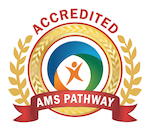How many times do we wish we could take back our words, or find the right words when engaged in a ‘war of words’ with our children? We all know no one ever comes out on top here. The adults just become frustrated, and the children defensive. To support parents in disciplining with respect, Westmont recently hosted an evening on Positive Discipline from the Heart, presented by Teresa La Sala. Ms. La Sala is a certified Positive Discipline coach who travels the globe giving words of wisdom to parents and educators. We had a great turnout with close to 30 parents in attendance including Westmont parents and parents from the greater community.
For a couple of hours we were entertained, as well as given sound advice on what to do when handling conflict and other behavioral issues with our children. Ms. La Sala made it seem so simple. For example, when a child does something unacceptable and you immediately say, “Why did you do that,” the child will usually respond: “I don’t know.” When this happens, that is as far as you will get, then you get angry and the child backs off completely. The only things accomplished here are the beginnings of a power struggle, a child who feels bad, and an angry parent.
Instead, here is a simple piece of advice that you can start using right away. Ms. La Sala suggests you change your line of questioning. Try instead saying, “What was going on when that happened,” or “What were you thinking when that happened.” By changing the question you are more likely to get a response and maybe get to the root of the problem through dialogue. A golden nugget for sure: it’s easy to do, and by doing so, you are not backing the child into a corner and you are protecting your child’s self-dignity too.
The parents who were present that evening wished for more. They were excited to go home and implement some new strategies. Ms. La Sala reminded us that she packed many weeks of presentations into a condensed evening event. She encouraged parents to look for other Positive Discipline workshops and continue on the path to achieving long-term positive results by the following means:
Strengthening communication
Alleviating power struggles
Praising effectively
Building on strengths instead of weaknesses
Gaining cooperation
Holding children accountable whilst keeping self respect in tact
Teaching children how to think and not what to think





